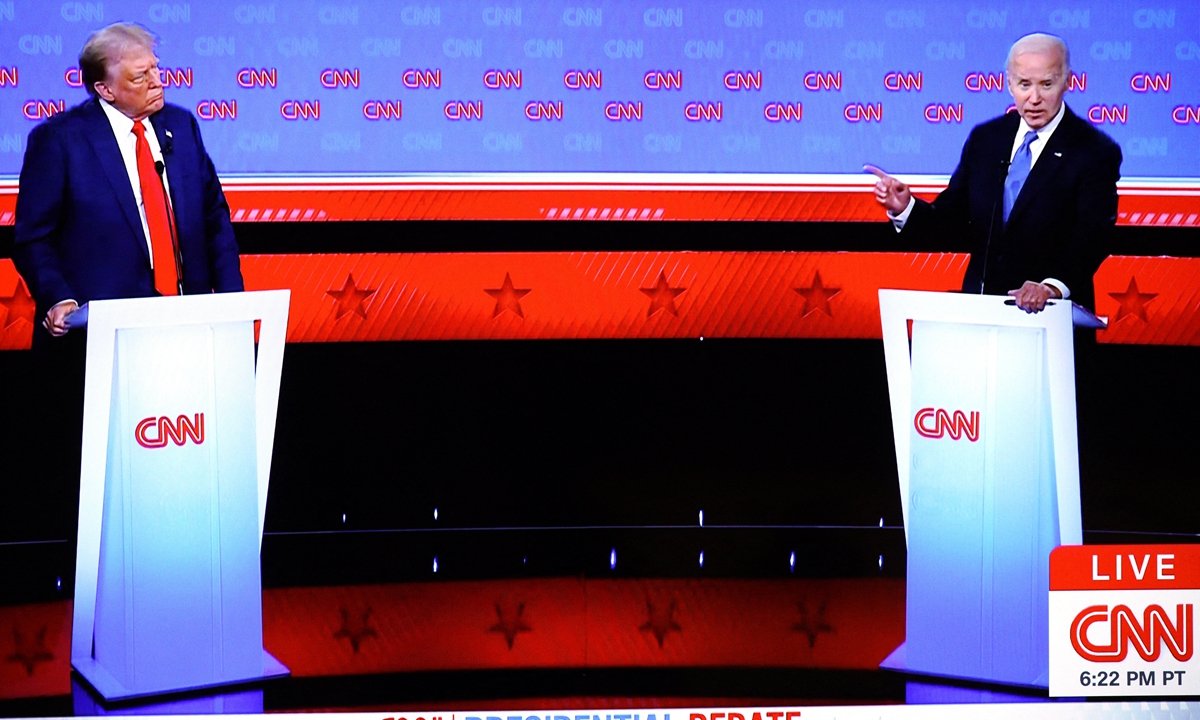
Incumbent US President Joe Biden and his rival former president Donald Trump have a televised debate on June 27, 2024 local time in a CNN studio in Atlanta, Georgia. Photo: VCG
As US President Joe Biden's "disastrous" performance at the Thursday debate sparked Democratic nominee replacement discussion, Chinese experts said this reflects public concerns about the aging of US presidential candidates, as well as the deep-seated contradictions in the US between the elites and the general public.
Divisions within the Democratic Party are anticipated to deepen with the upcoming presidential election and the potential for Biden's performance to deteriorate, experts said.
According to the AP on Saturday, Biden's halting debate performance has led some in his own party to begin questioning whether he should be replaced on the ballot for the 2024 election. Over the course of 90 minutes in the debate against former president Donald Trump on Thursday, Biden was only sometimes coherent, delivering meandering statements that were often inaudible, frequently veering off topic, and often running out of his allotted time mid-sentence, the Guardian reported.
A CNN flash poll suggested that 67 percent of debate watchers thought Trump turned in a better performance Thursday than Biden, with most saying they have no real confidence in Biden's ability to lead the country.
The New York Times on Friday published an opinion article entitled "To Serve His Country, President Biden Should Leave the Race," stating that "the greatest public service Mr. Biden can now perform is to announce that he will not continue to run for reelection."
CNN also cited several diplomats from Europe, the Middle East and Asia, who expressed shock and concern about the presidential debate, with one European diplomat describing it as "a bad night for Biden."
The discussion over replacing the Democratic nominee reflects public concerns about the aging of candidates in the US presidential election, as they do not want a sick and unclear-minded candidate to lead the country during a time when it is facing significant challenges, Li Haidong, a professor at the China Foreign Affairs University, told the Global Times on Sunday.
The political ecology and public opinion environment that Biden has to face reflect the general confusion of the public toward elite governance within the US, which was brought about by blind faith of elite figures in themselves, Li said. This demonstrates the deep-seated contradiction in the US nowadays, which is the one between the elites and the ordinary people, he said.
"The elites believe they can govern the country regardless of their capabilities, but the general public have no way to achieve this goal even if they have the desire to lead the nation," Li noted. "This reflects the tragic reality that the internal contradiction in the US is difficult to resolve through normal channels."
According to The New York Times, some Democrats have been mulling over a roster of names for nominating an alternative candidate, with Vice President Kamala Harris high on the list, while a crop of Democratic governors and other figures are often mentioned too.
However, Biden sought to extinguish anxieties among top Democratic donors as he spent Saturday personally reassuring them that he was up to the task of running for reelection and beating Trump, Politico reported.
Regardless of potential candidate changes, the lack of vitality in US rigid politics are unlikely to undergo significant changes. Gerontocracy poses great uncertainty and risks for both domestic and foreign affairs of the US, as Washington's decision-making may become fragmented and the risks faced by the US government may also increase, Lü Xiang, a research fellow of US studies at the Chinese Academy of Social Sciences, told the Global Times on Sunday.




